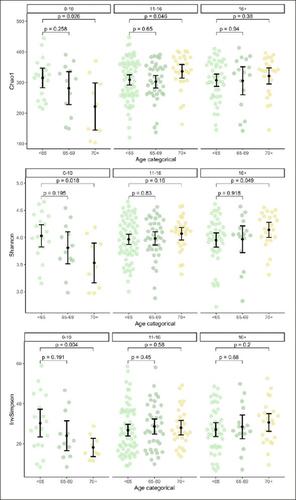The Journal of Prevention of Alzheimer's Disease ( IF 6.4 ) Pub Date : 2024-01-23 , DOI: 10.14283/jpad.2024.19 M. Klee , V.T.E. Aho , P. May , A. Heintz-Buschart , Z. Landoulsi , S.R. Jónsdóttir , C. Pauly , L. Pavelka , L. Delacour , A. Kaysen , R. Krüger , P. Wilmes , A.K. Leist

|
Background
With differences apparent in the gut microbiome in mild cognitive impairment (MCI) and dementia, and risk factors of dementia linked to alterations of the gut microbiome, the question remains if gut microbiome characteristics may mediate associations of education with MCI.
Objectives
We sought to examine potential mediation of the association of education and MCI by gut microbiome diversity or composition.
Design
Cross-sectional study.
Setting
Luxembourg, the Greater Region (surrounding areas in Belgium, France, Germany).
Participants
Control participants of the Luxembourg Parkinson’s Study.
Measurements
Gut microbiome composition, ascertained with 16S rRNA gene amplicon sequencing. Differential abundance, assessed across education groups (0–10, 11–16, 16+ years of education). Alpha diversity (Chao1, Shannon and inverse Simpson indices). Mediation analysis with effect decomposition was conducted with education as exposure, MCI as outcome and gut microbiome metrics as mediators.
Results
After exclusion of participants below 50, or with missing data, n=258 participants (n=58 MCI) were included (M [SD] Age=64.6 [8.3] years). Higher education (16+ years) was associated with MCI (Odds ratio natural direct effect=0.35 [95% CI 0.15–0.81]. Streptococcus and Lachnospiraceae-UCG-001 genera were more abundant in higher education.
Conclusions
Education is associated with gut microbiome composition and MCI risk without clear evidence for mediation. However, our results suggest signatures of the gut microbiome that have been identified previously in AD and MCI to be reflected in lower education and suggest education as important covariate in microbiome studies.
中文翻译:

教育作为轻度认知障碍的危险因素:与肠道微生物组的联系
背景
由于肠道微生物组在轻度认知障碍 (MCI) 和痴呆症中存在明显差异,并且痴呆症的危险因素与肠道微生物组的改变有关,因此肠道微生物组特征是否可能介导教育与 MCI 之间的关联仍然是一个问题。
目标
我们试图通过肠道微生物组多样性或组成来研究教育与 MCI 之间关联的潜在中介作用。
设计
横断面研究。
环境
卢森堡大区(比利时、法国、德国周边地区)。
参加者
控制卢森堡帕金森氏症研究的参与者。
测量
通过 16S rRNA 基因扩增子测序确定肠道微生物组组成。差异丰度,跨教育群体(0-10、11-16、16+ 教育年限)进行评估。Alpha 多样性(Chao1、香农和逆辛普森指数)。以教育作为暴露、MCI 作为结果、肠道微生物指标作为中介进行效应分解中介分析。
结果
排除 50 岁以下或缺失数据的参与者后,纳入 n=258 名参与者 (n=58 MCI)(M [SD] 年龄=64.6 [8.3] 岁)。高等教育(16 岁以上)与 MCI 相关(比值比自然直接效应 = 0.35 [95% CI 0.15–0.81]。链球菌和Lachnospiraceae -UCG-001 属在高等教育中更为丰富。
结论
教育与肠道微生物组组成和 MCI 风险相关,但没有明确的中介证据。然而,我们的结果表明,先前在 AD 和 MCI 中发现的肠道微生物组特征反映在较低的教育水平中,并表明教育是微生物组研究中的重要协变量。



























 京公网安备 11010802027423号
京公网安备 11010802027423号